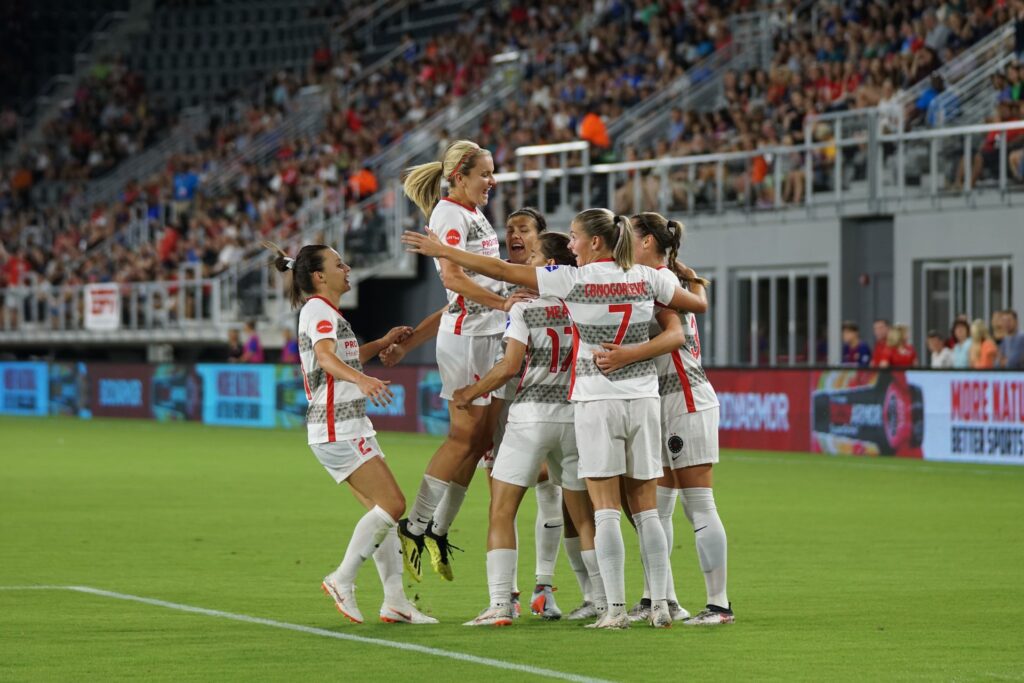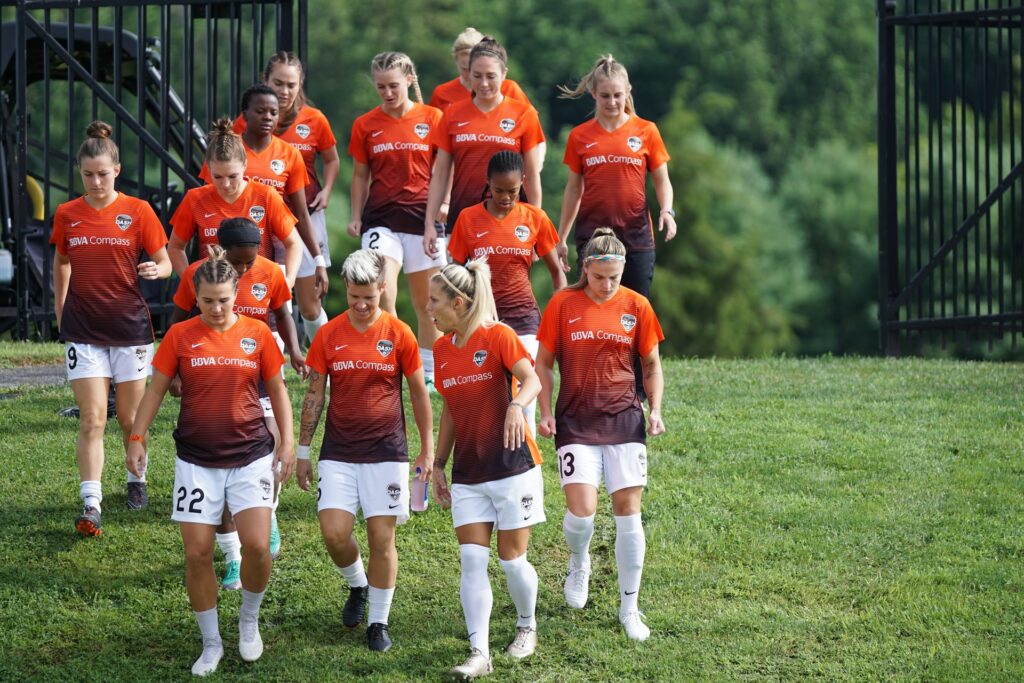Sports Marketing Insight from ActiveWin MD, Warren Jacobs
With male athletes dominating in sports marketing for decades, you would be forgiven for thinking the emergence of female-only teams is a recent phenomenon.
However, women’s football isn’t anything new. In fact, the first recorded women’s football match took place in 1895.
According to the official FA website, a women’s game at Crouch End once attracted a 10,000 gate. A crowd of some 53,000 spectators at Goodison Park attended a Boxing Day match, with thousands more locked outside by the 1920s.
However, it wasn’t until 1993 that it came under the auspices of the FA.
The FA started to ante up, funding the development of women’s football from the grassroots level in 1997.
The trickle-down effect was evident as football became the top sport for women and girls in England by 2002.
Yet it was during the 2019 Women’s World Cup that the world started to sit up and pay attention, and marketing campaigns from global megabrand Nike start appearing in mainstream media outlets and online.
FIFA 2019 Women’s World Cup
Part of this change in attitude was the success of the England men’s team in reaching the historic semi-final for the first time since Italia 1990, under Gareth Southgate.
But the media played a role in promoting women’s football as a viable sport and entertainment that the country should be more involved in.
The tournament marked a turning point in the way women’s football was marketed to the general public.
The coverage by the BBC of the 2019 FIFA Women’s World Cup brought it to a mainstream audience. While there wasn’t quite the same buzz surrounding the women World Cup, there was a marked change in attitude
Twitter and Facebook comments ranged from pleasantly surprised viewers watching the matches televised.
Billboards saying: “We’re not impressed by a semi” devalued the men’s 2018 World Cup performance (arguably increasing pressure for the lionesses to deliver)
Ultimately, the women were knocked out at the semi-final stage but unlike Harry Kane, Ellen White lost out on the Golden Boot.
White scored six goals but was denied first place due to the number of assists, and US duo Megan Rapinoe and Alex Morgan scored in the fewest minutes.
Had the women reached the final, or even won it, this kind of trash talk would have been fine. As it was, it had a detrimental effect on the perception of England Women’s Head Coach, Phil Neville.
A Man in a Woman’s World
Despite jokes about the ‘Poundland Gareth Southgate’ after Phil Neville became England’s women football head coach, it was a statement of intent.
Love him or loath him, Phil Neville has a plethora of silverware, 59 caps for England, six Premier League titles, three FA Cups, and a UEFA Champions League medal.
He has a winners’ mentality, and he expects his team to achieve similar success.
However, if his team cannot deliver to the highest level, he risks becoming a laughing stock in the media.

Sports Pundits and Commentators
On the other side of the coin, there are women athletes using their success to change perceptions of women’s football.
Perhaps the poster girl for women’s football in the UK is former England and Arsenal defender Alex Scott, MBE.
Retiring from football in 2018, Scott moved full time into media roles. However, even in her playing days, she was at the forefront of promoting the game.
Scott founded ‘The Alex Scott Academy’ in 2011, while still playing.
As a partnership with Kingston College and Puma, it developed female footballers aged 16-19 was the first of its kind in the UK.
In August 2018, she became the first female football pundit on Sky Sports after joining the Super Sunday team.
Aside from football, she won the Bear Grylls’ Mission Survive challenge in 2016 and made it to the quarter-final of BBC’S 2019 series of Strictly Come Dancing to raise her profile even further.
Yet, she has spoken about receiving abuse on social media, due to her role as a football pundit.
Reluctant Fans & Haters
For every England fan cheering the lionesses, there were plenty of keyboard warriors whose views ranged from the disparaging, e.g. “The standard of women’s football is so poor it’s like watching Sunday League” to the downright disgusting, misogynistic, and hateful.
For some, women still have no business playing, commentating on, or discussing football in any arena.
Thankfully, mainstream media and those involved in men’s football are working hard to change that.
It is a delicate balance between supporting the women’s game and ‘fighting women’s battles for them’, but some influential players have approached it just right.
Gary Lineker is an England hero and a national treasure. His Twitter feed was just as active and just as excited as the previous summer during the FIFA 2019 Women’s World Cup.
Yes, it is part of his job, but he’s never shy about expressing his opinions.
For instance, he replied to another tweet when he said: “It’s football. It’s a World Cup. It’s England in a semi-final. You’re a bore.”
Lineker is not alone in focusing on the game and the teams’ achievements over their gender. And he is one of the most powerful. Still, it was ‘World Cup fever’ which drew so many positive tweets from the ex-pro and his colleagues.
So, what of women’s football when there isn’t a national tournament to unite the nation?
Women’s Club Football
We’ve looked at women’s football from a national perspective, but the World Cup takes place every four years. If the game’s advocates don’t want to lose the momentum they have built, women’s club football must follow suit.
Different clubs take varying approaches to how they market their women’s teams.
Both Manchester City and Manchester United have separate twitter accounts for their women’s team. The difference is Man Utd prefer to keep the women’s news separate on its feed, while Manchester City incorporates women’s football news results on the main Twitter account.
City’s Facebook page follows the same format; match reports, goals, transfers, and team news for the women’s matches are handled in the same way as men.
Yet, the official Manchester City Women’s FC Facebook page hasn’t updated since 2014 presumably because the content has been effectively integrated into the club’s main page).
This culture of ‘it’s all about the football and the fans’ is epitomised by MCFC Head Coach Pep Guardiola.
For example, Pep was quoted correcting reporters when they failed to acknowledge the women’s team’s successes.
When asked about potentially winning the first-ever domestic treble in English football in May 2019, Guardiola said: “Men’s. The first time in men’s [football]. The women have won it.”
He was correct, of course. Arsenal women won their first domestic treble in 1993 and repeated the feat three times since then.
But it is this awareness and acknowledgement of achievements in women’s football which set Pep, and City, apart.
The message from Manchester City Football Club is unambiguous; there is nothing secondary about the achievements of any City team or player, regardless of age or gender. This directly reflects their ‘one club for all’ ethos.
It could be argued this is easier to do when the women’s team are at the top of their game.
Manchester City Women did the domestic double in 2019, scooping both the FA Cup and the League Cup.
Since turning pro in 2014, these are some of the honours in a string of silverware accumulated by City ladies

The Future of Women’s Sports Marketing
The national tournaments raise the exposure of women’s football and close the gap between athlete brand sponsorships in the UK.
In 2019, the US Women’s National Team are reportedly paid more than the men’s team. Rumour has it at $34.1m plus healthcare benefits to $26.4m.
However, male players earn more on matches and performances, compared to the women’s base salary.
This means male players can make more than women, but women are outperforming them on both a league and national level.
The gender pay gap enquiry rumbles on, but the US Women’s team won half of the FIFA Women’s World Cups since 1991 and victories in 2015 and 2019.
Compare this to the men’s US national team; they haven’t made it to the semi-final, were knocked out in the round of 16 in 2010 and 2014, and failed to qualify for France 2018.
In other words, women are the dominant force in UK international football.
Football is a business, with interest in the game fuelled by media coverage and achievements.
It is a perpetual cycle; the higher the standard of play, the more interest in the game and the more money generated. It then gets invested back into the game, and the cycle begins again.
There is a long way to go until the UK gets behind England’s Lionesses in quite the same way as their male counterparts, and even longer before women’s games start replacing some of the less exciting men’s games in the Match of the Day run down.
CoVid-19 has thrown a spanner into the world of sports for most of 2020. It will go down in history as the year with an asterisk because of lockdown.
But, perhaps women’s football and other so-called minority sports will come into their own this decade.
Time will tell.
Online Sports Marketing Experts
A surge in coverage of women’s football can bring much-needed fan base development, like any other any sports franchise.
The same fundamentals apply to sports marketing as any advertising.
However, nuances are often overlooked because of lack of experience.
ActiveWin Media has a team of over 140 professional digital markets across multiple channels, including PPC, CRM, and SEO. We encourage sports marketers to contact us for a free digital health check to improve your online marketing strategy.


